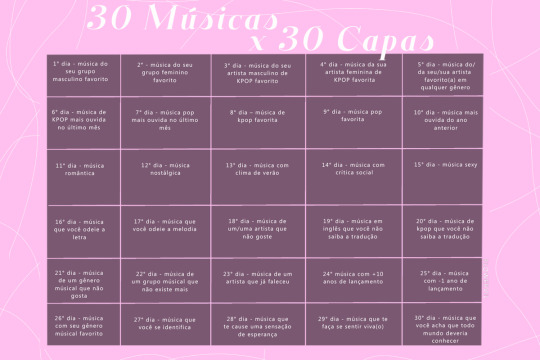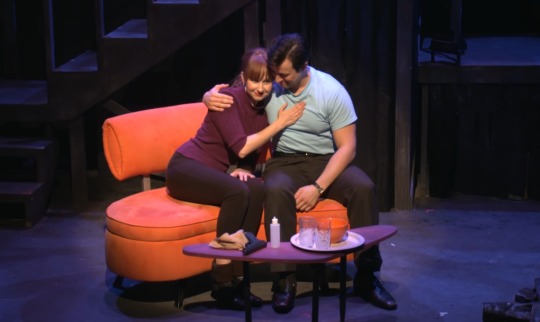#social spi
Explore tagged Tumblr posts
Text
Olá pessoal, tudo bem com vocês? Eu realmente espero que sim, para quem não me conhece eu sou a Nath (@.flowervil). Bom, eu comecei a editar capa lá em 2019, dois anos depois de começar a usar o Spirit, e eu sempre via as inúmeras capistas do site lançando seus desafios pessoais e achava isso um máximo! Eu, particularmente, sempre tive muita vontade de ter ideia para meus próprios desafios pessoais mas nunca conseguia, então eu acabava entrando nesses desafios das outras capista e isso sempre foi muito bom para mim, aprendi muito com isso e até hoje tem inúmeras capistas que me inspiro muito. Esses dias enquanto pensava em uma ideia para capa, tava ouvindo uma música que estou ouvindo muito esses dias e pensei: Por que não fazer as minhas capas inspiradas em músicas e MVs que eu gosto? Foi pensando nisso que nas últimas duas semanas eu montei uma tabelinha com trinta dias para cada música, são 30 músicas dentro de conceitos que achei interessante abordar e que se bem criativo dará grandes resultados. Resolvi compartilhar aqui, porque achei bacana a ideia e acredito que todo mundo pode desenvolver alguma parte que tenha dificuldade de trabalhar nas edições usando as ideias das músicas. Então espero que vocês gostem da ideia e adotem ela, vai ser muito bacana ver vocês participando. Eu não sei se algum outro capista já teve alguma ideia parecia ou desafio igual a esse, porque nunca havia visto nenhuma ideia parecia antes, então se houver, dou os créditos a artista.
— O desafio: serão 30 dias, no total vocês irão fazer 30 capas, não precisam fazer em dias seguidos e nem mesmo na ordem de sequência da tabela, só tentem concluir o desafio. Quando forem postar as capas do desafio usem a TAG #30MX30C, para que todos possam ver as obras de artes feitas, e não se esqueçam de doar as capas no final do desafio e de divulgarem a música que vocês usaram como inspiração.

#30mx30c#capa para fanfic#capista#capa para social spirit#social spirit#capa para spirit#capa para fic#fanfic#capa spirit#capa social spirit#social spi
113 notes
·
View notes
Text
i love the "doing this" scene in spies are forever a lot because i love reversal of the compulsory romance trope but also cause of the way it portrays "let's just be friends" as not something throwaway but actually gives the gravity that the concept of "friends" has. this is the point when they decide they actually want to work together, not out of obligation or repaying a debt or societal convention, but because they actually respect each other as people. the entire romantic exchange that they have is loaded with societal convention. they have opened up to each other a little bit - but the moment the song starts they are back to wearing a mask, hiding their true intentions almost as much as when tatiana hid her true intentions of betraying curt back in the casino. it's back to societal conventions and the closeness that they have built up dissipates. the romantic exchange could play out completely without them actually getting closer emotionally, and they could go their separate ways the next day. but it all changes when they decide to be "just" friends. curt's "friends?" question is open and hopeful - the first genuine bid for closeness in the whole scene. can we talk about the line "it's great to know we don't have to pretend". that's the whole scene right there. having to pretend to be interested in a romantic relationship got in the way of them being genuine and actually getting closer. can we also talk about "you're cool with me?" "till the end" because its just a really nice line and i love it. anyway, i just love that in this scene friendship is not just a throwaway byproduct of getting romantic advances rejected but actually something that is deeply important to the characters. curt having tatiana's friendship is a key turning point in the whole play for him to start moving on from his past. i love it when friendship is important!!!

them<3
#spies are forever#also i love how awkward the little hug is lol#two socially inept spies figuring out how friendships work
163 notes
·
View notes
Text



ㅤ𖣠 ICONS TOTALLY SPIES (120X120) . • °


















Like ou reblog se usar! Créditos não são obrigatórios, mas sempre apreciados.
#mahgi#120x120#icons 120x120#icon 120x120#120x120 icons#icons spirit#spirit icons#icons para spirit#social spirit#spirit fanfics#icons 2d 120x120#totally spies#totally spies icons#sam totally spies#clover totally spies#alex totally spies#matchings icons#três espiãs demais#120×120 icons
117 notes
·
View notes
Note
From Kenny and I:

Will he be on rampage and collision this weekend because I'll cancel my plans if so??
#cancel all my socializing progress kenny omega is home#don't mind us we're super spies xd#definitelydivergent#asked
7 notes
·
View notes
Text
i just rewatched one step ahead and the staircase scene (because i don't know i just wanted to feel something). and of course it hits, because the relationship between curt and owen is very well written and well acted and all the parts come together beautifully and you feel for both of them, especially after seeing curt's journey through the musical and recontextualising the dma's actions.
but it hits in another way that it didn't (for me at least) when i first watched it, which is in owen's motivations. chimera has the ability to make spies obsolete with the use of technology. a box in a room can do what a spy does, but in seconds. nowadays, ai can write and be "creative" (massive asterisk there) with predictive text models, typing a book in a matter of minutes. but curt says it sounds boring, that they as spies should remember the impact they had on people, the lives they saved. because a computer cannot measure the emotional impact its works have on those it benefits (also i'd argue ai can't actually make art). ai cannot care about what it does, there is no emotional resonance with what it does. but it's easier, less costly, maybe less dangerous, so it takes those opportunities away, substituting human works for machine bullshit
i just think it's neat how, with time, this awesome and multi-layered musical has had another layer added to it (or brought to the surface). anyway watch spies are forever. or rewatch it.
#and of course also social media surveillance with data mining and the lack of safety the online world currently provides to us. anyway#spies are forever#saf#agent curt mega#owen carvour
21 notes
·
View notes
Text
Spy Another Day
Spy Another Day
Spy Another Day
Spy Another Day
Spy Another Day
Spy Another Day
Spy Another Day
Spy Another Day
Spy Another Day
Spy Another Day
Spy Another Day
Spy Another Day
Spy Another Day
Spy Another Day
#yes i did it 14 times because its two weeks until SAD baby#i mean I wont be able to see it until the digital ticket#but still#two weeks#twooooo weeeeks#i just need more spies#i hope the cast talks about it a little on social media#i know everyone is focused on the starkid show and thats valid but im still hyperfocused ok#spies are forever#tin can bros#tinlightenment world tour#saf#tcb#spy another day
22 notes
·
View notes
Text
ADHD Curt Mega nation what symptoms do you think he displays/what are specific hcs u have abt adhd Curt Mega
I’m making a compilation of him being incredibly ADHD and I’m sectioning it
I have my thoughts but id love to hear others :) ty
#spies are forever#adhd curt mega#he’s so me#I think the ones I see the most are social difficulty stimming impulsivity RSD and extreme emotions/trouble regulating them#ily agent Curt mega#agent curt mega#saf#tcb#tin can brothers
14 notes
·
View notes
Text
willy wonka has schizoaffective disorder fight me
#yeah sure dude you became a recluse because of candy spies#I’m sure your intense hyperfixation and weird social presentation had nothing to do with it#schizoaffective#actually schizophrenic#shitpost
5 notes
·
View notes
Note
will tumblr ever hear about the great fake dating scheme of 2024
oh????? tumblr do your thing
#shitpost#fake dating#story time#it lasted 6 months#social experiment#i had to tell my real bf about it lmao#funny#asks#pls#pranks#long con#we felt like spies
5 notes
·
View notes
Note
Was Henry A. Wallace a spy or just a Soviet tool?
I think Wallace was just deeply idealistic and probably a true Socialist at a time when Americans could not differentiate between Socialism and "evil" Soviet Communism (well...Americans still can't do that), and that his idealism allowed the Soviets to use him to their advantage. But I definitely don't believe he was a spy or even a conscious Soviet asset.
Calder Walton wrote a book last year called Spies: The Epic Intelligence War Between East and West (BOOK | KINDLE | AUDIO) that was published my Simon & Schuster and I actually posted this excerpt a few months ago about Wallace and the Soviets during the Cold War that might answer your question a bit better:
Russian archival records obtained for this book show that [Joseph] Stalin colluded with his favorited U.S. candidate in 1948, Henry Wallace, [Franklin D.] Roosevelt’s Soviet-friendly wartime Vice President. The nature of Wallace’s relationship with the Kremlin has long been a subject of speculation. Soviet intelligence is known to have unimaginatively code-named the Vice President CAPTAIN’S DEPUTY during the war. But no evidence has ever emerged that Wallace was recruited as a Soviet agent. He was, however, we can now discern, a Soviet tool. He sincerely believed that “peaceful coexistence” between the Soviet Union and the United States not only could be achieved, but was essential for world peace. All the while, he looked away from (and naively followed Soviet propaganda denying) the existence of Stalin’s mass forced labor and terror programs. According to [President Harry S.] Truman’s counsel Clark Clifford: “It was never clear to me how aware he [Wallace] was of the uses to which the Communist Party was putting him, but whether he knew it or not, he was following the communist line, serving communist ends, and betraying those Americans who supported him as a serious alternative to the two main candidates [in 1948].” Wallace’s naivete about Soviet communism turned him into an asset for Stalin, if not a recruited Soviet agent. Wallace decided to run in the 1948 U.S. election as the Progressive Party nominee. In April and May that year, he secretly liaised with Stalin about public policies that would be advantageous for the Soviet Union, coordinating his public statements with the dictator. Wallace secretly met with the youthful Soviet ambassador to the UN in New York, Andrei Gromyko, who dispatched the candidate’s messages to the Soviet foreign minister, [Vyacheslav] Molotov, and to Stalin himself. In his memoirs, Gromyko admitted to meeting Wallace, but downplayed the meeting’s significance, suggesting that after talking with him he considered that Wallace had lost contact with the pulse of American life. Archival documents in Moscow reveal that in fact Stalin took Wallace’s position and candidacy seriously, approving his public positions, and answering questions that the former Vice President put to him, which Stalin annotated in his distinctive pencil. Their alignment produced a published open letter from Wallace to Stalin, vetted by the Soviet leader in advance, to which Stalin then publicly replied, all as agreed between the two men. Wallace’s Presidential election bid in November 1948 dismally failed; he ended up getting barely 2 percent of the vote, while Truman, to his and the nation’s surprise, won a second term. He defeated New York Governor Thomas E. Dewey in one of the greatest upsets in U.S. Presidential history. Ironically, the staff of Wallace’s failed 1948 campaign included none other than the Soviet atom spy Ted Hall. Following his unsuccessful White House run, Wallace had a crisis of faith in his pro-Stalinism. This may have been caused by his realization that Stalin had used and discarded him after the election. Stalin had gotten what he wanted from Wallace. In 1952, Wallace published an article, “Where I Was Wrong,” describing “Russian Communism” as “utterly evil.” The Kremlin and its intelligence services nevertheless learned an important strategic lesson for later in the Cold War: that it could use the freedoms inherent within American electoral campaigns to influence candidates favorable to the Soviet Union.
#History#Henry A. Wallace#Vice Presidents#Vice President Wallace#Henry Wallace#Soviet Union#Soviets#Cold War#Communism#Socialism#1948 Election#Joseph Stalin#Stalin#Spies#Spies: The Epic Intelligence War Between East and West#Calder Walton#VPs#Cold War History#Espionage
8 notes
·
View notes
Text




CP| Coleção de capas divertidas 2019/2021!
Só as que eu acho 'apresentaveis'
#capa para fanfic#capa para fic#capa para social spirit#capa para spirit#flowervilblog#social spi#capa de fanfic#fanfic#capa divertida#social spirit#capa spirit#capa social spirit#spirit fanfics
34 notes
·
View notes
Text


On July 1st, 1963, the BBC reported that Harold ‘Kim’ Philby had been finally identified as ‘the third man’ of the Cambridge Spy Ring, which also included Guy Burgess and Donald Maclean. Philby had been working for the Soviets during his entire time with the British Foreign Office, which included an assignment at the British Embassy in Washington, liaising with the CIA. Ironically, in the late 1940s, Philby had worked as Britain’s head of Anti-Communist Counterespionage.
Lord Privy Seal, Edward Heath, told the Commons that while working for MI6 in Washington (around 1950-51), Philby had used his inside knowledge to warn Burgess and Mclean that they had been rumbled, allowing them time to escape to the Soviet Union. At that time Philby’s involvement was suspected, although not proven, but he was ousted from the Foreign Office on the orders of then Foreign Secretary, Anthony Eden, and the investigation remained open.
According to BBC reporting in July 1963;
"…British authorities had always suspected there was a "third man"…Mr Philby, often known as Kim, had been working as a journalist in Beirut when he disappeared four months ago…"
Philby subsequently turned up in Moscow, from where he denied that he had tipped off Burgess and Mclean, and said that Maclean had actually been alerted to the fact that the security services were onto him when the M15 agents tailing him got a little carried away and accidently bumped into his car.
Philby became a Russian citizen, a KGB General, and was awarded the Order of Lenin. He died in 1988 and was buried with Soviet military honours.
The Cambridge Spy Ring consisted of a group of 1930s university students who were recruited by Soviet agents. The motivation, according to the BBC, was ideological rather than financial, prompted by the belief that capitalism was corrupt and life beyond the Iron Curtain offered a ‘better model for society’.
“…The Cambridge spy ring was informally led by Harold 'Kim' Philby. He and his friends later moved into jobs in British Intelligence and the Foreign Office where they had access to top secret information. They spent their working lives passing valuable information to the Soviet Union…”
The identities of the fourth and fifth Cambridge Spies were not revealed until much later. Anthony Blunt was named in 1979, and John Cairncross in 1990. Cairncross had tipped off the Soviets in time for them to change their codes before Bletchley Park had cracked them, and it was believed the information he passed on about British and US atomic weapons programmes laid the foundations for the Soviets' nuclear capabilities.
There’s a little more on the Cambridge Spies in this 1999 BBC Report ( a classic piece of vintage internet);
#social history#uk politics#uk government#Cambridge spies#kim philby#the third man#intelligence services#cold war#soviet union#british culture#modern history
17 notes
·
View notes
Text
I was talking with some friends on how the govt is pushing anti gay bills and how they overturned rode v wade and I realized that this country is fucked up on so many levels.
#I mean aren't we supposed to have rights???#and as a cis woman I find anti abortion laws hella unfair#like what if I were r*ped??? I'd be forced to mother a child of some fucked up geezer!!!#AND I CANT GET RID OF THAT CHILD BC OF ANTI ABORTION LAWS??? THE GOVT FORCES ME TO LIVE WITH THAT TRAUMA???#WHAT ABOUT WOMEN WHO DIE IF THEY GIVE BIRTH??? WHAT ABOUT THAT????#and then the govt decides to ban pretty much all adult and gay content from all social media and spy on us#using our data for their own benefits. THATS fucked up. SUPER FUCKED UP. imagine if u were spied on#America is supposed to be a people's country. but it's not. not anymore or really anytime soon. it's fucked up.#AND I CANT HELP OUT BC IM A MINOR AND SENSITIVE INFO THIS THAT THE OTHER. It sucks >:(#ugh. America.#bear rambles#this country might as well be communist#<- (I don't mean to stir up emotions saying that. /srs /gen)
19 notes
·
View notes
Note
Im sorry I've been missing the past few days! From kenny and i!!!

It's okay, I know you're busy 💕💕
Miss him so bad, need him healthy, need him back!!!!
#truthfully its been a stressful week for me and I've been distancing from all socials because of it#don't mind us we're super spies xd#definitelydivergent#asked
2 notes
·
View notes
Text
IN THE CONCERT VERSION OF DOING THIS THEY HOLD HANDS AT THE END???
ILOVE THEM
the imagery of them holding hands (romantic, misunderstanding) at the start and then holding hands (platonic, affection) at the end
and how platonic affection what tatiana was going for in the first place, it takes a whole song and a rejected kiss for curt to realise that, but then he finally returns the gesture
#im not over these socially awkward spy besties#spies are forever#i'll be thinking about this scene forever
4 notes
·
View notes
